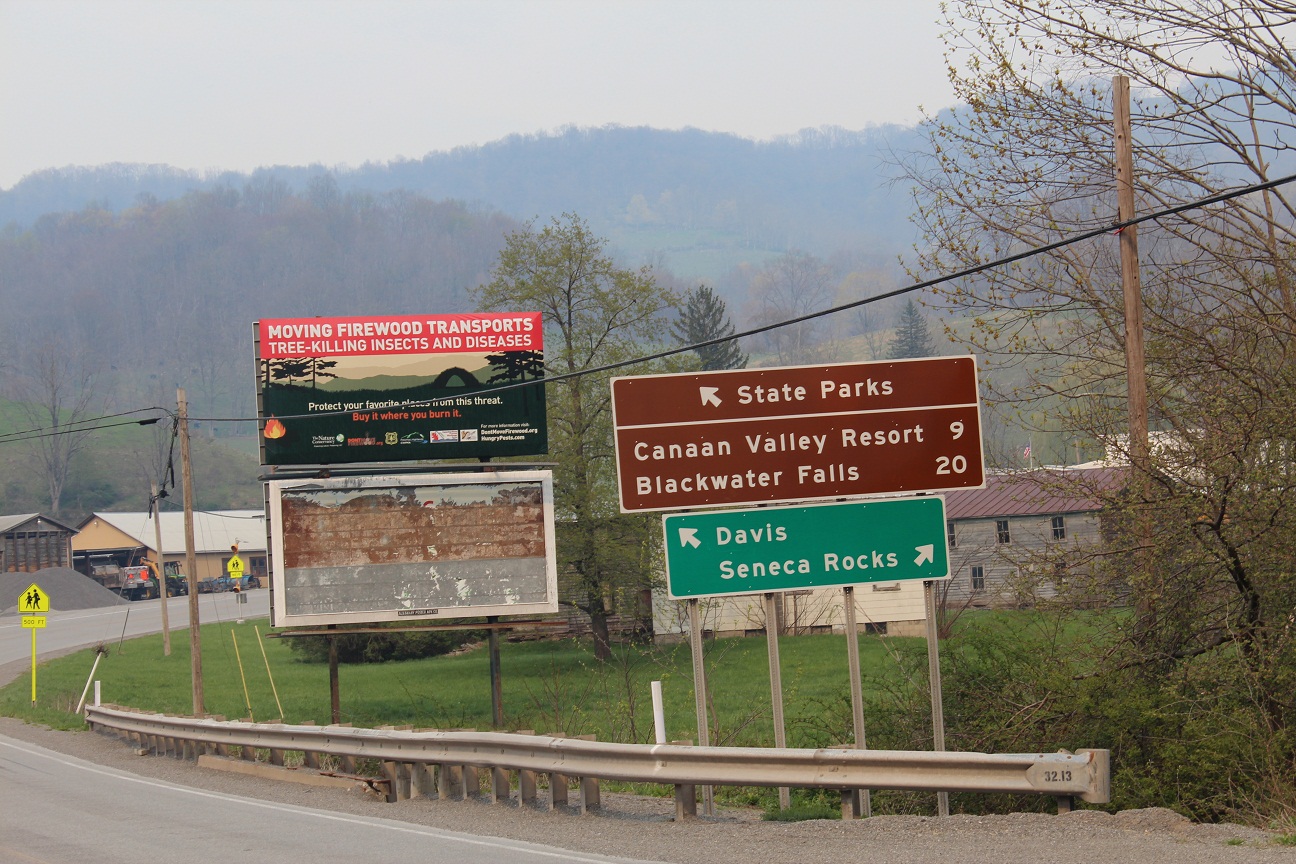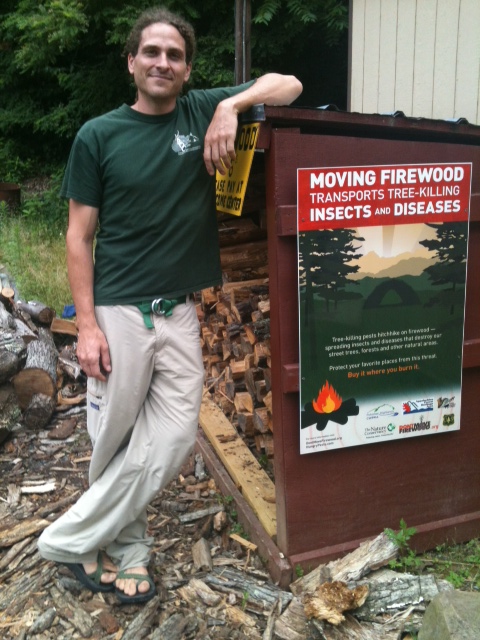Guest blog by Cynthia Sandeno, Monongahela National Forest, West Virginia
Visitors coming from out of state to camp in West Virginia will notice an important message during their travels. New billboards proclaiming the message “Don’t Move Firewood” have been established across the state in high-traffic locations to remind visitors to protect their favorite areas by buying firewood locally and using it locally.

In the fall of 2012, the Potomac Highlands Cooperative Weed and Pest Management Area (CWPMA) received funding to implement a large-scale project designed to inform travelers and citizen scientists about the steps they can take to prevent the introduction and spread of invasive pests. The project, “Slowing the Onward Movement of Pests,” also called STOMP, combines a number of outreach techniques including highway billboards, educational displays at visitor centers in state parks, forests and other locations, public service announcements, and training workshops. The CWPMA partnered with the “Don’t Move Firewood” Campaign to design posters, billboards, and postcards to help spread this important message.
The Potomac Highlands CWPMA is a partnership of people, agencies, and organizations who have come together to combat non-native invasive species in the headwaters region of the South Branch of the Potomac River in West Virginia and Virginia. Working with the West Virginia Chapter of The Nature Conservancy, the organization was assisted in their mission to spread the “Don’t Move Firewood” message by the use of advertising space donated by Lamar Advertising Company. Lamar donated advertising space on four billboards in strategic locations to help increase travelers’ awareness that moving firewood can also move tree-killing insects and diseases. This generous donation allowed the CWPMA to reach visitors from neighboring states reminding them not to move firewood. “We would have never been able to reach as many people without the generous donation from Lamar,” said Andrea Brandon from TNC. “Many people travel into West Virginia along these roads and will be reminded that they can make a difference.”
West Virginia is home to the Monongahela National Forest (MNF) which is located in the east-central part of the state. The Forest is the largest expanse of public land in the state, contains an estimated 52% of the publically available recreation land in West Virginia, and is the fourth largest National Forest in the 20 northeastern states. The Forest is located in proximity to major population centers of the region, including Washington, D.C., Baltimore, Philadelphia, and Pittsburgh making travel routes to the Forest high-risk locations for the introduction and spread of invasive species. The Monongahela is one of the founding partners of the CWPMA and has been leading the implementation of the STOMP project.
“Being able to work with the many partners of the CWPMA has led to much greater success than we would be able to accomplish on our own,” said Cynthia Sandeno, Ecologist on the Monongahela National Forest. “Through the STOMP project, we are able to use private, state, and federal lands to help protect the health of West Virginia’s forests by increasing awareness,” said Cynthia.
The economy of West Virginia relies heavily on forest products, agriculture, and natural resource-based tourism; and is well known for its biological and cultural riches, recreational opportunities, and beauty. Invasive pests are a threat to all of these resources. The Asian longhorned beetle has not been found in West Virginia, but has been found just miles away in Bethel, Ohio making the travel routes between these two states high risk vectors for the spread of this species. If the Asian longhorned beetle becomes established in West Virginia, it has the potential to cause more damage than Dutch elm disease, chestnut blight, and the spongy moth combined. Lamar Advertising donated two billboards near the routes entering West Virginia from Bethel, Ohio.

In the coming months, the “Don’t Move Firewood” message will also be spread to state parks and forests where educational displays will be installed to help reach even more people, including those that live in the state. “We want to make sure that residents and visitors know that even moving firewood between counties within West Virginia could introduce harmful pests,” said Andrea Brandon. “By buying locally, campers can prevent unwanted pests from invading forests, fields, and waterways and causing environmental and economic damage.”
The first “Don’t Move Firewood” posters have been installed in campgrounds located at Nelson Rocks Outdoor Center, a climbing and zip lining facility that receives over 10,000 visitors annually. And, nine additional educational displays will be installed in August of 2013 in nature centers at state parks and forests that have received campers from Bethel Ohio. Without the help of the “Don’t Move Firewood” Campaign and the assistance of manager Leigh Greenwood, West Virginia would not have been able to develop these important outreach tools.



